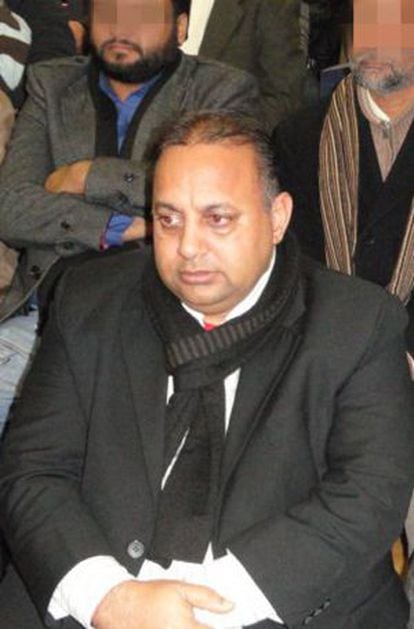The community leader who was actually a drug-trafficking ringleader
Police operation against astute Pakistani businessman nets largest ever heroin haul

It wasn’t unusual to see Rajda Shaoib Satti mingle with Catalan politicians, often posing with them for photographs at different events. Until the end of 2010, Satti was the president of the Federation of Pakistani Associations.
On December 17, he was arrested by the National Police and the Civil Guard in an anti-drugs sweep, and was charged with being one of the leaders of a criminal gang that imported some 64 kilos of heroin through Barcelona, according to law enforcement authorities. Officers claim that Satti personally sent a container to the Barcelona port from Afghanistan filled with 90 packets of heroin.
“I never saw him involved in anything shady,” said Saleem Bhatti, vice-president of the Catalan Federation of Pakistani Organizations. “We are all surprised.”
Satti has been living in Spain for many years and was known to be an astute businessman.
“Recently he was running an international call center and worked at a restaurant,” Bhatti told EL PAÍS.
Satti was arrested at his home in Badalona (Barcelona).
The criminal group brought in the drug through the mail as well as using the Barcelona port for its large shipment, police sources said.
The undercover operation that busted the drug trafficking ring is the largest on record in terms of the amount seized of what is known as “brown sugar,” a type of heroin that consumers often mix with cocaine. After a six-month investigation, officers arrested eight people who allegedly formed the criminal network in Spain, and were dedicated to importing the substance from Afghanistan.
The group used Barcelona’s port and mail packages to move the heroin
In September, officers found a 3.7-kilo package of heroin in a mailbox in Martorell (Barcelona), which led to the arrest of a 42-year-old Pakistani. <TB>A month later the police found another 3.3 kilos of heroin sent but this time hidden inside book covers and arrested two Spanish citizens, aged 24 and 29.
But that was just the beginning of the investigation. Through phone taps and further inquiries police discovered that the traffickers were about to send a large shipment to Spain. In order to do so, the suspects created a ghost company called Lindi-Pak, based in the center of Barcelona, which purportedly was set up for the export and import of food products. But they made a mistake by using the name of a deceased person.
“If there hadn’t been an ongoing investigation, they would have gotten away with it,” said one police source.
Police chief inspector Rodrigo Mendoza said at a press conference on Monday that the heroin was stashed inside 18 struts at the bottom of the container.
It took the police officers about three hours to unload the container, which was filled with 20,000 kilos of salt packages. With the help of firefighters and a crane, they turned the container upside down and found 90 packets, each with 57.7 kilos of heroin.
Further analysis revealed that the drug was of a high quality: between 40-45 percent purity, slightly above the normal 42 percent purity of brown sugar, the police said.
“With that amount, 1.5 million doses could have been easily distributed,” Civil Guard Captain Ángel Pardos said.
Afghanistan is the largest exporter of heroin. In 2011, the country produced 61 percent of world production, or about 5,800 tons, according to the UN Office on Drugs and Crime.
Police are still investigating how the traffickers laundered the money from their sales.










































